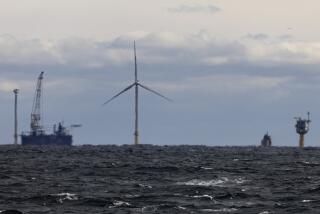Loss of Contract Leaves Power Project in Dark : New York canceled a $15-billion agreement to buy electricity. If construction is halted, economic effects will ripple throughout Quebec.
- Share via
TORONTO — Ever since the mammoth, government-owned utility Hydro-Quebec lost the lead foreign purchaser for its vast James Bay hydroelectric project, Canadians have been wondering whether Hydro-Quebec will go ahead with the mega-project on schedule--or at all.
The James Bay project is a sprawling complex of hundreds of dams, dikes and generating stations in the northernmost reaches of Quebec. If its construction were halted completely, the effects would be felt throughout the Quebec economy and beyond.
Many of the James Bay dams have already been built. But the project in its entirety is years from completion. The next phase of construction--the one now in question--was to have been along the Great Whale River. The Great Whale phase alone was expected to cost $11.5 billion.
Such levels of spending have made Hydro-Quebec the No. 1 engine of economic growth for Canada’s Francophone province. And the engineering feats undertaken for the James Bay project have been a source of tremendous local pride.
But in recent years, the project has come under increasingly fierce criticism from environmentalists, and from Quebec’s Northern Cree Indians, who complain that it is an improper use of their ancestral lands. Some Quebec economic analysts and even ratepayers had also joined the anti-James Bay chorus.
Against that backdrop, Gov. Mario Cuomo announced in March that the state of New York was canceling a contract to buy nearly $15 billion worth of electricity from Hydro-Quebec over the next 21 years.
The announcement has cast doubt not only over Hydro-Quebec’s plans for the Great Whale phase, but also over the hopes of Quebec’s Francophone sovereignty backers, who have argued that Quebec could be a viable independent country, with earnings from hydroelectricity exports as a key component of its international balance of trade.
Analysts in Quebec say the cancellation will hurt not only Hydro-Quebec’s finances but also prospects of numerous Quebec companies that have benefited handsomely from the project up until now.
Hydro-Quebec says that it still intends to go ahead with the Great Whale River phase, but at a slower pace. A spokeswoman for the utility, Marie-Pierre Bonnassieux, said that Great Whale’s three powerhouses will now be completed in 2008, instead of 2000, as originally planned. And capital spending by the utility for the rest of the decade is expected to be reduced from about $54 billion to about $40 billion.
Ihor Kots, managing director of Canadian Bond Rating Service Ltd. in Montreal, applauded Hydro-Quebec’s decision to slow down. He said that export earnings normally account for only 5% to 7% of Hydro-Quebec’s total revenues, so that the loss of the $15 billion, while serious, was not a knockout punch.
“If there’s any concern that the bond market might have, it would be with respect to (Quebec’s push for sovereignty), rather than to the electricity export sales,” he said.
He added that the James Bay project had become a lightning rod for all manner of criticism, and said he hoped the construction delay would give the province “breathing room” in which to make sound environmental assessments and unemotional decisions about how to spend its money.
But Robert Blohm, an American investment banker working in Montreal--and an outspoken critic of the James Bay project’s financial underpinnings--painted a bleaker picture. He said he thought Hydro-Quebec had been relying too heavily on bond sales to American investors, and that the utility had now lost an important means of covering its U.S.-dollar-denominated interest costs.
He said he thinks Quebec ratepayers will not be willing to cover the financing costs of the giant complex, and he contended that as a result, Hydro-Quebec’s finances are in much worse shape than the utility is letting on.
Time will tell which view is right. Meanwhile, Cuomo’s decision to pull out of the Hydro-Quebec deal has left relations between Quebec officials and the Crees at a new low point--even though Cuomo cited economics, and not environmental issues or the Crees’ concerns about social justice as the basis of his decision.
“I blame (the Crees) for discrediting Quebec all over the world,” said Quebec’s provincial energy minister, Lise Bacon. “Do you think a Quebecer can accept that? I don’t think so.”
A Project in Peril
New York’s decision not to buy $15 billion worth of electricity from the James Bay project has jeopardized the development, a controversial system of dams and reservoirs in northern Quebec. The next phase of construction--the one now in question--was to have been along the Great Whale River.
So far the project has:
* Flooded 4,000 square miles of sub-arctic forest.
* Required the excavation of enough earth to reconstruct the Great Pyramid of Cheops 80 times.
If completed, it would:
* Flood an area the size of Lake Ontario.
* Generate 26,400 megawatts, enough to light the homes and industry of a city of 13 million, twice Quebec’s population.
Supporters say: The project is Quebec’s best hope for economic and political independence.
Critics say: It sacrifices one of the last corners of virgin wilderness in the Northern Hemisphere.
More to Read
Sign up for Essential California
The most important California stories and recommendations in your inbox every morning.
You may occasionally receive promotional content from the Los Angeles Times.









